Boston Terriers come in more colors than a box of crayons! From seal brown to bright white, these dapper pups sport wildly diverse coats thanks to their intriguing genetics.
While “tuxedo” black and white is the classic look, you’ll also spot cinnamon, cream, red, and liver-colored Bostons. Each unique hue results from the interplay of different genes. It’s like nature’s way of making every Boston Terrier one-of-a-kind.
Kennel clubs recognize specific colors over others for showing. But in reality, all the vibrant shades of Boston add to their charm! A flashy fawn coat, a brindle pattern, or curious calico spots – these distinctive looks make each dog unique.
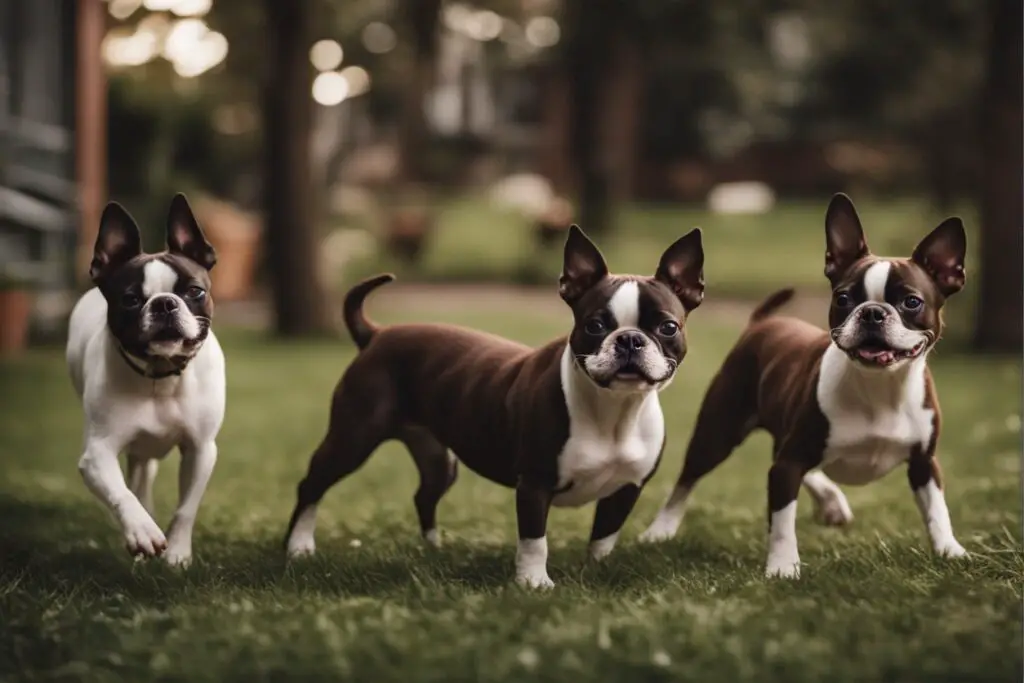
So next time you see a Boston, appreciate their dashing diversity! Their snazzy coats come in infinite colors and patterns as unique as the pups within. Check out their vibrant fur, but look deeper to see what makes Bostons shine – their lively, lovable spirit!
Table of Contents
- 1 Exploring Boston Terrier’s Rare Colors
- 2 Classic and Common Boston Terrier Hues
- 3 Significance of Boston Terrier Markings
- 4 Boston Terrier Color Health Implications
- 5 Comparing Boston Terriers with Other Breeds
- 6 Boston Terrier: Standard Vs. Nonstandard Colors
- 7 Wrapping Up on Boston Terrier Colors
- 7.1 FAQs
- 7.2 What are the standard colors for Boston Terriers?
- 7.3 Are blue or red Boston Terriers considered purebred?
- 7.4 Does coat color affect a Boston Terrier’s health?
- 7.5 Are there any grooming differences between different colored Boston terriers?
- 7.6 How does a Boston terrier’s coloring affect its price?
- 8 Related posts:
- 9 Boston Terrier Puppies (24 of the Cutest Pups)
- 10 Unveiling the Blue Boston Terrier: An In-Depth Guide
- 11 Ultimate Guide to Raising a Boston Terrier Puppy
- 12 25 Boston Terrier Dogs
Exploring Boston Terrier’s Rare Colors
Uncommon Hues
Boston Terrier puppies are known for their classic black and white “tuxedo” coat. But did you know there’s a whole rainbow of rare colors that these dogs can sport? Picture a pup with blue, lilac, or even red fur!
- Blue: This color is caused by a dilution gene. The pup’s coat appears grayish-blue, and they often have striking blue eyes to match.
- Lilac: This unique hue is a mix of blue and chocolate genes. It’s not purple as the name suggests but rather a light, silvery color.
- Red: Also known as chocolate, this color ranges from a light reddish-brown to deep mahogany.
Why Are They Rare?
These colors are less common because they’re recessive traits. Both parents must carry the gene for the rare color for their puppies to inherit it. Plus, some colors, like albino (all-white), aren’t recognized by organizations like AKC because of associated health issues.
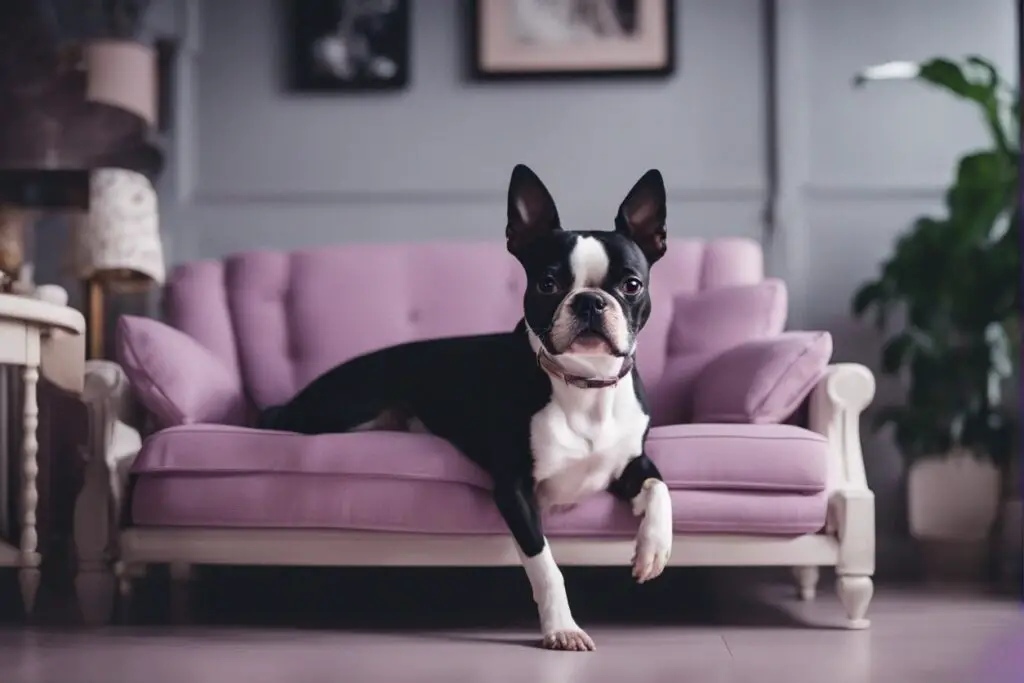
Impact on Value
Rare-colored Boston Terriers can be pretty desirable. Their unusual hues make them stand out from the crowd and can increase their value. But remember, no matter what color your pup’s paws are or whether they have a white blaze on their face or not – it’s their personality that genuinely matters next!
Classic and Common Boston Terrier Hues
Black, Brindle, and Seal Coats
Boston Terriers sport three typical hues: black, brindle, and seal.
- Black: Pure black with no white or red undertones. It is often paired with brown eyes.
- Brindle: Mix of black and hazel hairs creating a dark brindle look.
- Seal: Appears solid black but has red undertones when in the sun.
These shades are prevalent due to genetics. The coat color gene determines the appearance of each Boston Terrier’s coat.
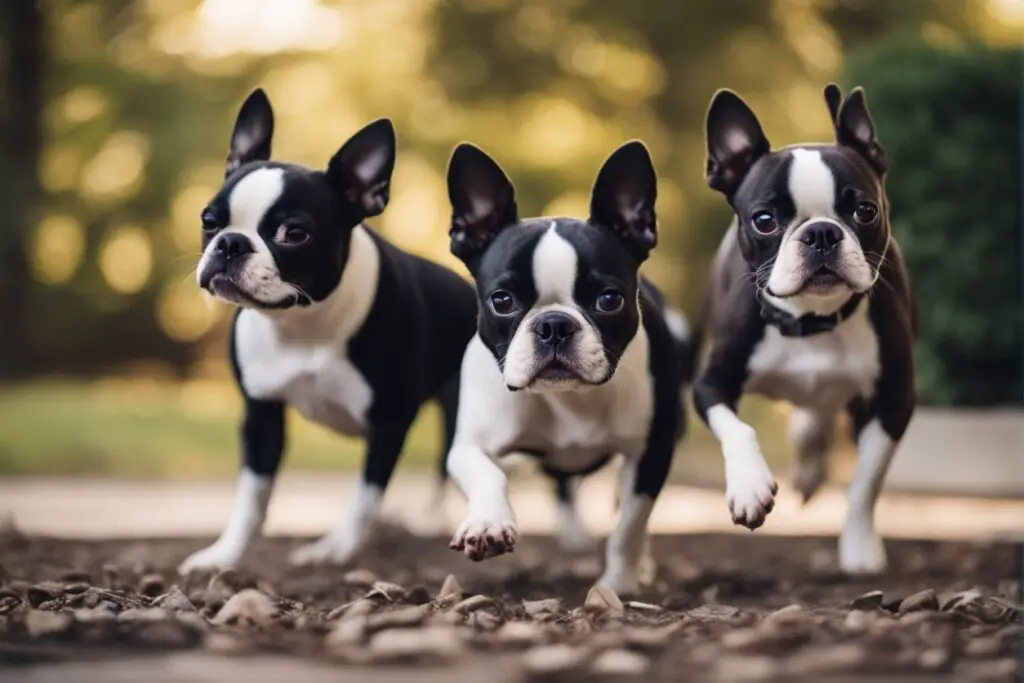
Role in Breed Recognition
The kennel club recognizes these hues as standard for Boston Terriers. The unique mix of colors gives them their distinct look:
- Solid black coat
- Dark brindle coat
- Seal brindle coat with hocks showing red undertones
Remember, it’s not just about the hue but also how it complements their overall appearance!
Significance of Boston Terrier Markings
Have you ever noticed the white chest or muzzle patches on a Boston Terrier? Those are their typical markings.
- The white markings are like an artist’s signature on a masterpiece, adding unique touches to each dog’s appearance.
- These markings aren’t just random designs; they’re a product of genetics.
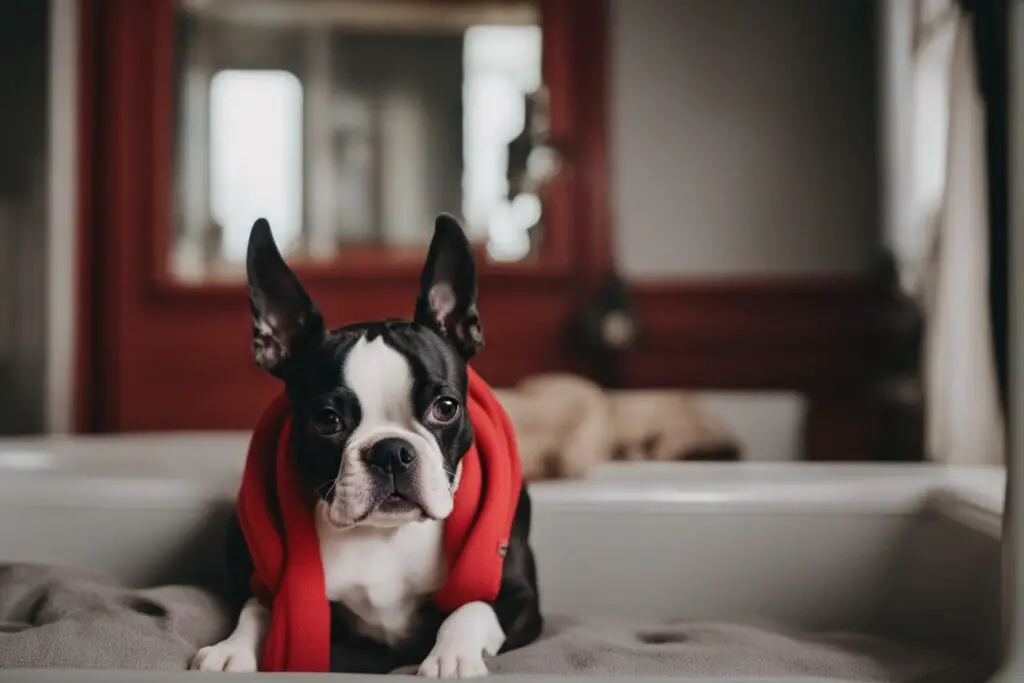
Typical Markings
Boston Terriers often have these distinct patterns:
- White chest
- Muzzle patches
- White blaze between the eyes
- White forelegs
These add character and individuality to each dog.
Genetics and Markings
Just like human fingerprints, no two Boston Terriers have identical markings. Here’s why:
- Each pup gets one set of color genes from each parent.
- These genes dictate the marking patterns.
- So, while all Boston Terriers might share similar traits, their specific markings are as unique as they come!
So next time you see a Boston Terrier, take a moment to appreciate its unique markings – nature’s artistry at work!
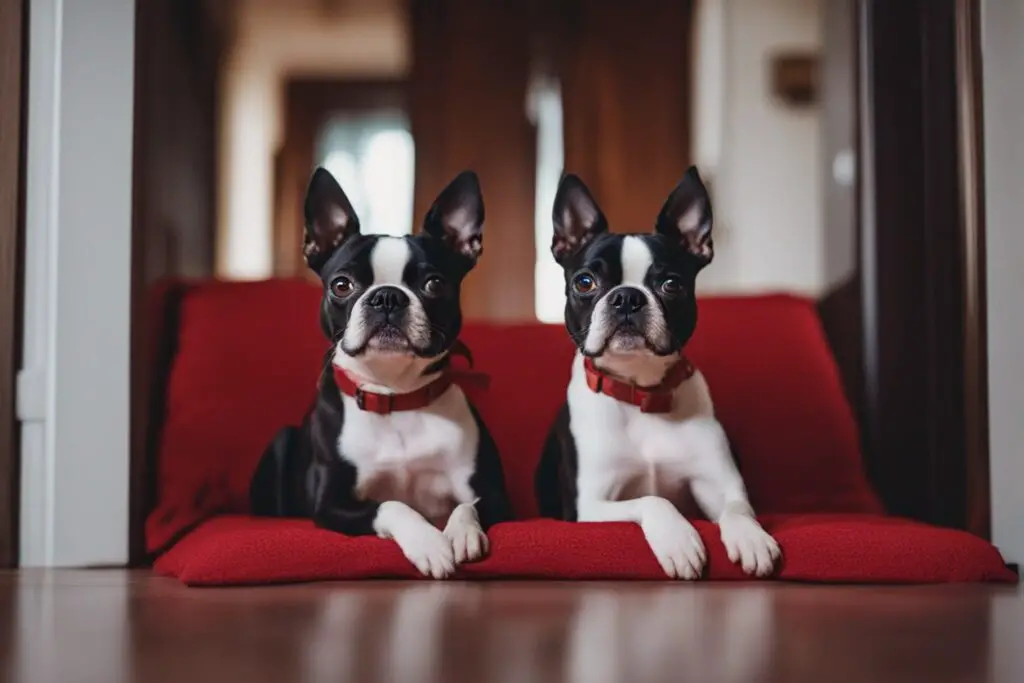
Boston Terrier Color Health Implications
Certain coat colors in Boston Terriers link to specific health problems.
Blue Coats and Eye Syndrome
Blue-coated Boston Terriers often suffer from Blue Eye Syndrome. This condition causes:
- Vision impairment
- Complete blindness in severe cases
It’s not a given, but it’s common enough to be a concern.
Coat Colors and CDA
Color Dilution Alopecia (CDA) is another issue that correlates with diluted coat shades. Dogs with this condition experience:
- Hair loss
- Skin irritation
- Dandruff
Again, not all dogs with diluted coats will have CDA, but the correlation is strong.
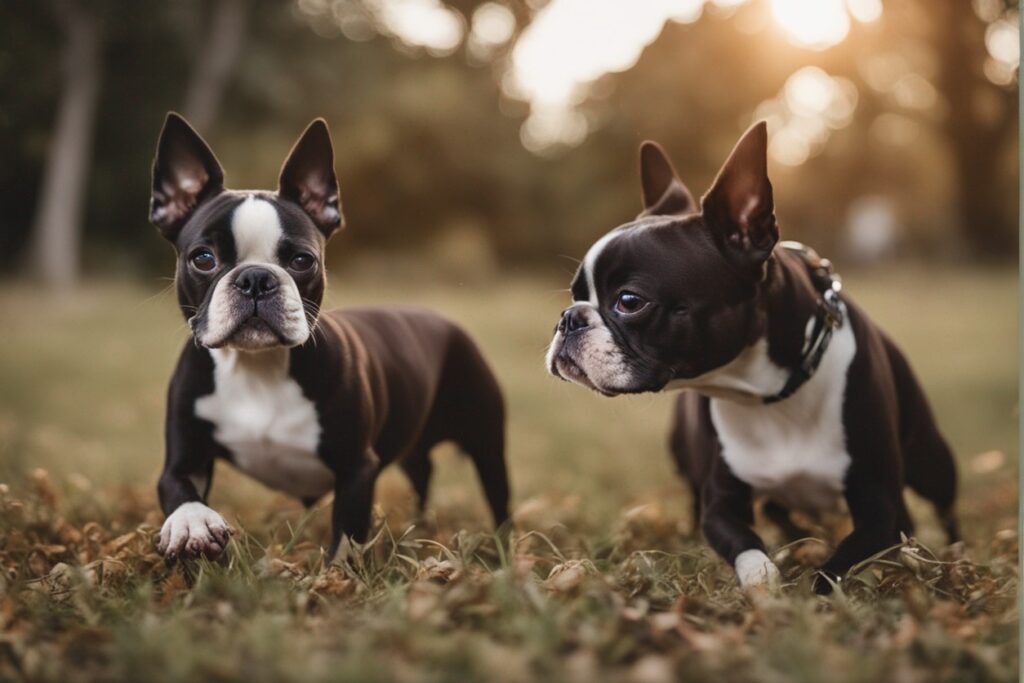
So you see, while we all love the variety of Boston Terrier colors, certain shades can hint at potential health issues down the line.
Comparing Boston Terriers with Other Breeds
Color Range in Different Breeds
Boston terriers, bulldogs, boxers – all these dog breeds have different color ranges. While some species, like bulldogs and boxers, sports colors from fawn to brindle, Boston terriers stand out with their distinct black, brindle, or seal (black with a red cast in sunlight) colors combined with white.
- Bulldogs: Fawn, Red
- Boxers: Fawn, Brindle
- Boston Terriers: Black, Brindle, Seal
Unique Colors of Boston Terriers
Got your mind on a show dog? Here’s a thing to remember about Boston terrier colors. Unlike other dogs competing in kennel club competitions, they’ve got a unique set of breed standards. For example:
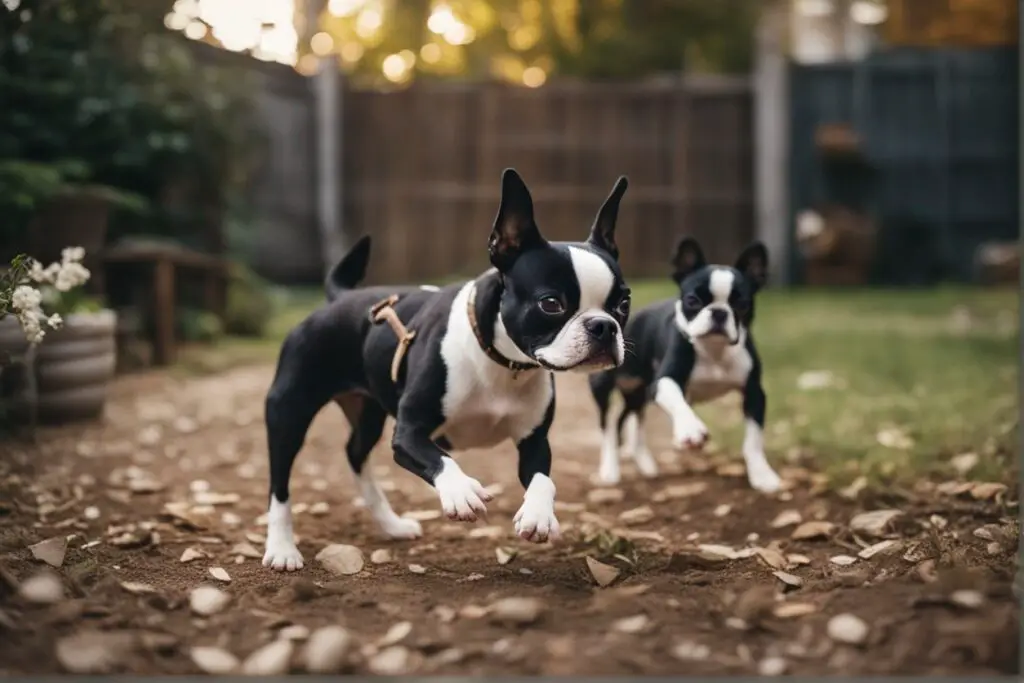
- A white chest is an aesthetic feature and a breed standard.
- The “seal” color – it’s exclusive to this breed.
Breed Standards Across Dog Shows
Breed standards can cause problems at dog shows. Each breed has specific criteria set by kennel clubs that determine what is acceptable for competitions:
- Bulldogs: Solid or piebald coat
- Boxers: White should not cover more than one-third of the entire coat
- Boston Terriers: Must have white muzzle band, white between eyes; collar, chest, and part or whole of forelegs and hind legs should be white.
The following table illustrates how these standards vary across different breeds:
| Breed | Color Standard |
|---|---|
| Bulldog | Solid or piebald |
| Boxer | White not exceeding one-third |
| Boston Terrier | Specific pattern |
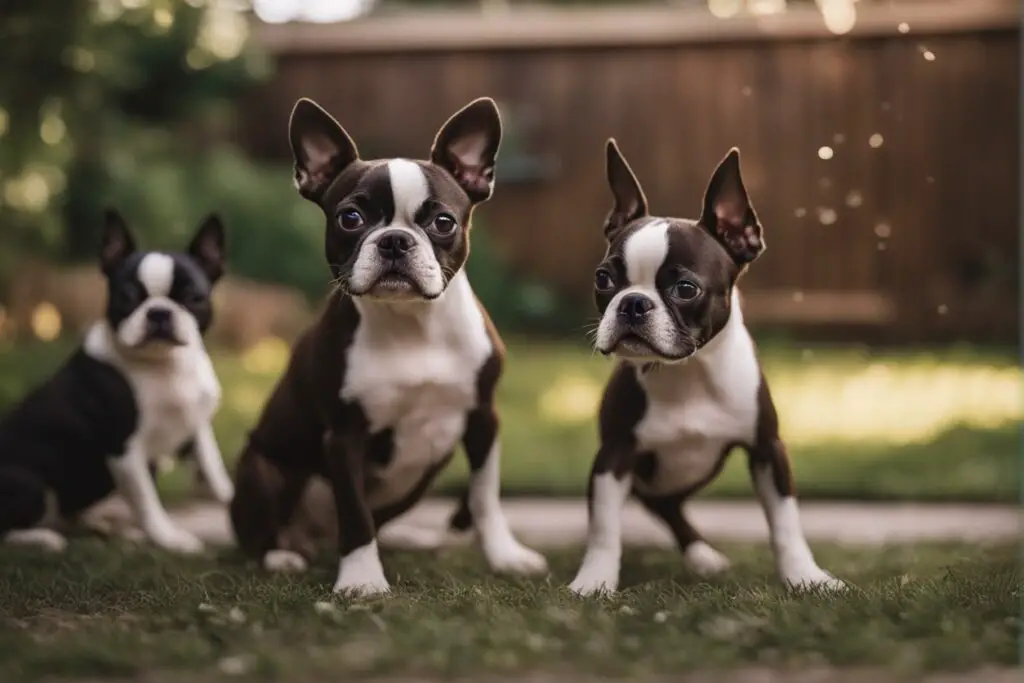
The world of dog breeds is as colorful as it gets! From the wide range of colors available in various species to the unique traits exclusive to certain ones like the Boston terrier – there’s always something new to learn about our four-legged friends!
Boston Terrier: Standard Vs. Nonstandard Colors
Boston Terriers come in a variety of colors. The breed standards set by the American Kennel Club (AKC) dictate that acceptable or standard colors are:
- Black
- Brindle
- Seal (black with a red cast when viewed in the sun or bright light)
These dogs should also have evenly marked white areas on their chest, muzzle, band around the neck, halfway up the forelegs, and up to the hocks on the rear legs.
On the flip side, we have nonstandard colors. Examples include:
- Blue
- Red
- Fawn
- Cream
The controversy kicks in here. Some breeders intentionally breed for these nonstandard colors to meet customer demands. However, this raises ethical questions about prioritizing appearance over health.
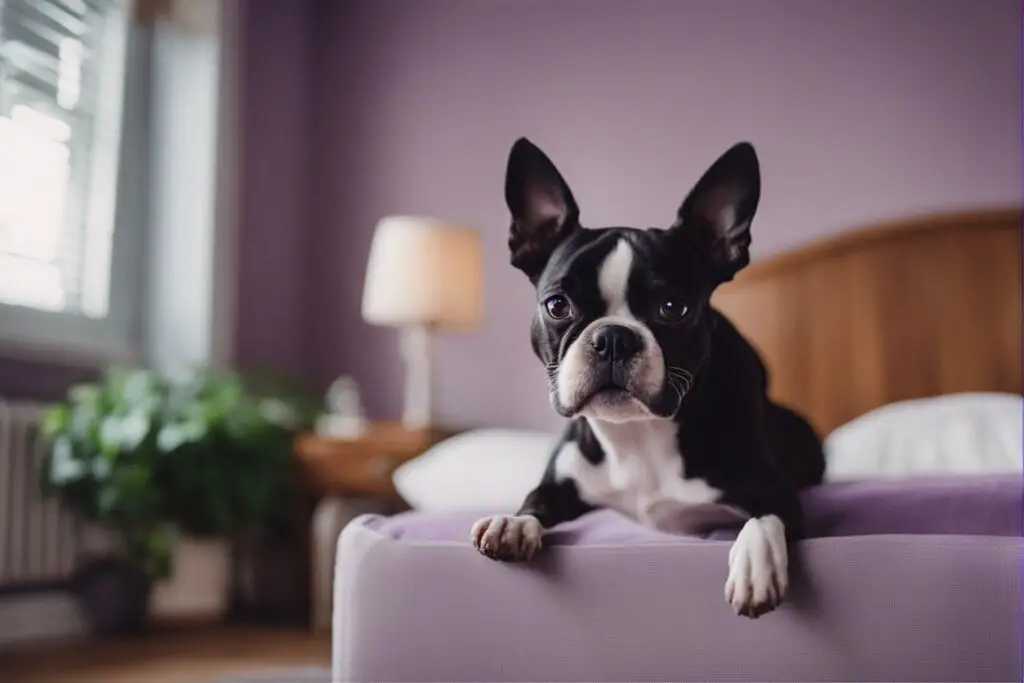
Why does color matter? Well, it’s all about show eligibility. According to AKC breed standards, only Boston Terriers of standard colors can participate in confirmation shows. So if you’re dreaming of a blue ribbon for your blue Boston…sorry, pal.
So remember:
- Breed standard = show dog potential.
- Nonstandard = not eligible for showing, but still 100% Boston Terrier love!
Remember though – every Boston is unique and special regardless of its coat color!
Wrapping Up on Boston Terrier Colors
So, there you have it! We’ve toured the rainbow of Boston Terrier colors. From the rare gems to the classic hues, each one is unique. But remember, color doesn’t define your pup’s personality or health. It’s just the icing on the cake of their irresistible charm.
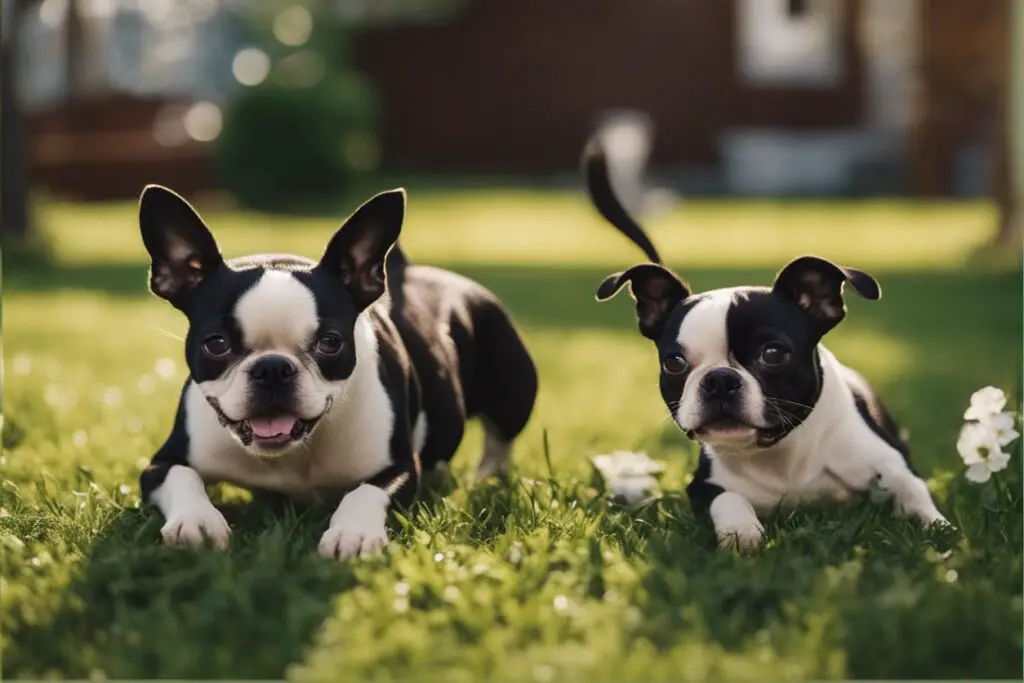
Before you dash off to find your new fur buddy, take a moment to think about what we’ve covered. The color spectrum is broad and varied but doesn’t let that distract you from what matters – their health and temperament. Ready to welcome a Boston Terrier into your life? Go for it! Just remember – love them no matter what color their coat is!
FAQs
What are the standard colors for Boston Terriers?
The standard colors for Boston Terriers are black, brindle, and seal (a color that looks black but has a red cast when viewed in sunlight), all with white markings.
Are blue or red Boston Terriers considered purebred?
Blue or red Boston Terriers are not recognized as standard by kennel clubs like AKC because these colors are not traditionally found in purebred lines. However, they can still be purebred dogs.
Does coat color affect a Boston Terrier’s health?
No scientific evidence links a Boston Terrier’s coat color directly to its health. However, irresponsible breeding practices may connect specific nonstandard colors with genetic conditions.
Are there any grooming differences between different colored Boston terriers?
Nope! Regardless of their coat color, all Bostons have short hair that requires minimal grooming.
How does a Boston terrier’s coloring affect its price?
Nonstandard colored Bostons like blues or lilacs often fetch higher prices because they’re considered more unusual. But remember – all Bostons make great pets regardless of their color!